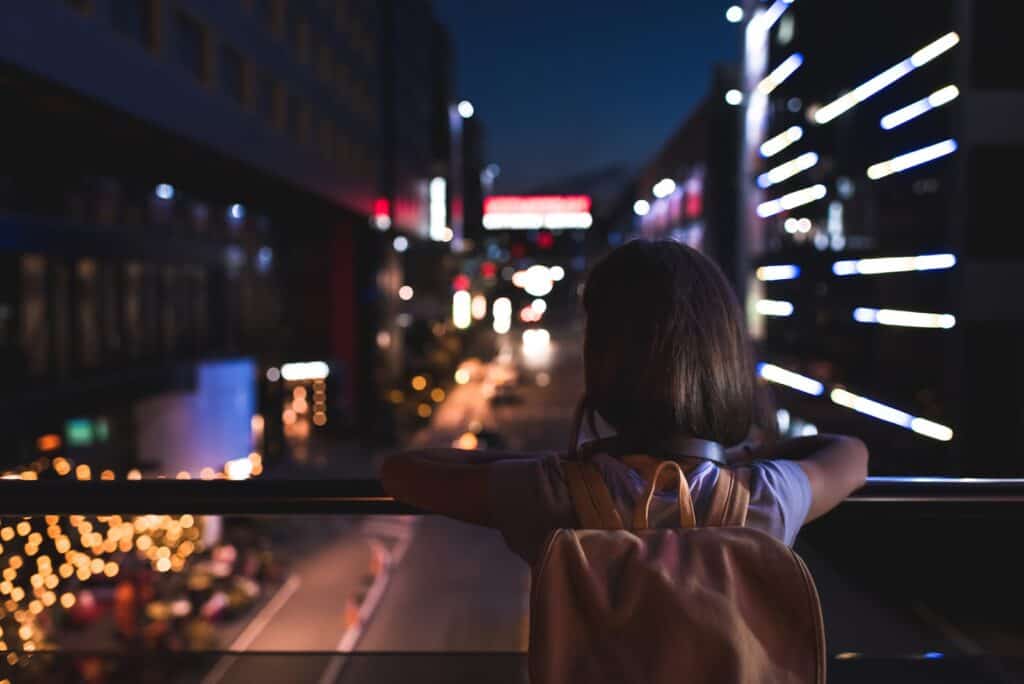
While there are people who are absolutely terrified of being alone in the dark, there are just as many who prefer and even love it. Spending alone time in the dark can be a powerful experience that can go both ways. So why do I like being alone in the dark?
Enjoying solitude in the dark is often preferred due to its calming effect, better focus, and sensory relief. The absence of light and noise allows for deeper introspection and relaxation, aiding in mental clarity and reducing sensory overload, making it a sought-after experience for many.
Far from the conventional fear or discomfort often associated with darkness, many find a unique solace in its embrace. Rather than a journey into fear, this article is a revelation of the unexpected comforts and insights that darkness provides.
From the practical advantages for our eyes to the psychological benefits of solitude, each point in this article unveils a layer of this nocturnal preference, offering perspectives that might just turn your next encounter with the dark into a moment of introspection and peace.
Why Do I Like Being Alone In the Dark?
From the soothing calmness it brings to the mind and body to the deeper introspective journeys it fosters, each point illuminates a different reason why darkness can be so captivating.
Let’s reveal these facets and understand the profound connection some of us have with being alone in the dark. Here are 10 reasons why you find yourself enjoying alone time in the dark.
Night’s Silence Improves Focus and Mental Clarity
Distractions fall away in the hush of night. This quietness creates an environment where thoughts can flow uninterrupted. The absence of daily noise – the hum of traffic, the chatter of people, the clatter of activity – means your mind isn’t pulled in multiple directions.
During this tranquility, you find a clearer path to concentrate, to jump into tasks or thoughts that require undivided attention. It’s not just the absence of sound; it’s the presence of a peaceful space where your mind can operate at its best.
- Reduced auditory distractions.
- Enhanced concentration.
- Ideal for tasks requiring deep focus.
- Mental space for introspection.
- Clarity in problem-solving.
Inspires Awe and Reflection
The darkness of night often brings a sense of vastness, an expansive feeling that the day doesn’t always provide. This expansiveness ignites a sense of awe, an appreciation for the grandeur of the universe and our place within it.
Such moments inspire deep reflection, a journey into the self, and contemplation of life’s bigger questions. It’s a time when the mind wanders through the cosmos of thoughts, exploring ideas and emotions that often lie dormant during the day’s hustle.
- Sense of the universe’s vastness.
- Reflection on life’s larger questions.
- Self-exploration.
- Contemplation of existence.
- Emotional introspection.
Night’s Coolness Soothes the Senses
There’s a palpable change when night falls; the air cools, bringing a refreshing contrast to the day’s warmth. This coolness is far more than a physical sensation; it cascades over your senses, soothing them. It’s a balm to the heat of daily life, calming your mind and body.
Given this cooler atmosphere, thoughts seem to take on a sharper edge, emotions find balance, and the body relaxes into a state of ease.
- Relief from the day’s heat.
- Sensory relaxation.
- Sharpened thoughts.
- Emotional balance.
- Physical comfort.

Dark’s Mystery Nurtures Curiosity
Darkness shrouds the world in mystery. What’s familiar by day becomes intriguingly unknown by night. This transformation sparks curiosity, an urge to explore and understand what lies hidden in the shadows.
It’s a mental stimulation that encourages imaginative thinking and creativity. The darkness hides while also inviting you to seek, to look beyond what’s visible, and step into the depths of the unknown.
- Transformation of familiar into mysterious.
- Stimulation of imagination.
- Encouragement of creative thinking.
- Exploration of the unknown.
- Mental engagement with surroundings.
Darkness Provides a Sense of Calmness
In darkness, there’s a unique sense of calmness that envelops you. This goes far beyond the absence of light; it’s a presence of peace.
It’s as if the world slows down, allowing you to catch your breath, to relax into the moment. This calmness is a sanctuary from the day’s turmoil, a space where you can unwind and decompress. It’s a time when the world feels at rest, and so can you.
- Slowing down of the world.
- Personal sanctuary.
- Relief from the day’s stress.
- Unwinding and decompressing.
- The feeling of the world at rest.
Black is Easier on the Eyes
The color black, synonymous with darkness, is inherently gentle in our vision. Given a societal norm where our eyes are constantly bombarded by screens and artificial lighting, the darkness offers a reprieve. It reduces eye strain, particularly important in our screen-centric lives.
This is particularly evident in many people’s increasing preference for Dark Mode or Night Mode on phones and other devices. These modes replace the typical bright backgrounds with darker colors, significantly reducing the amount of light emitted by screens. This reduction is key in minimizing eye strain, especially in low-light environments or during nighttime use. Our eyes are not naturally designed for prolonged exposure to bright screens, and the high contrast of traditional modes can be taxing.
Dark Mode offers a more comfortable visual experience, reducing glare and making it easier for our eyes to adjust. It also mirrors the natural decrease in the light we experience in the evening, aligning with our circadian rhythms and contributing to better sleep quality. The preference for Dark Mode goes beyond aesthetics; it’s a practical choice for maintaining eye health and comfort in our digitally dominated world.
This is also because when surrounded by darkness, the eyes relax, adjusting to a state where less light means less work for them. This is beneficial for the moment and also provides a proactive measure to maintain long-term eye health. In darkness, the eyes find their natural rhythm, unforced and at ease.
- Reduction of eye strain.
- Less exposure to artificial light.
- Natural adjustment of eyes to low light.
- Proactive eye health care.
- Rest for visual senses.
Helps You to “Be Yourself”
During solitude and in darkness, the societal masks we wear fade away. Alone in the dark, there’s no need to conform to expectations or perform for others. This freedom allows for an unfiltered exploration of self.
It’s a space where you can confront your thoughts and feelings without external judgment or interruption. Here, in the privacy of darkness, personal growth and self-acceptance are nurtured. This environment offers a unique opportunity to be completely honest with oneself.
- Freedom from societal expectations.
- Space for self-reflection.
- Unfiltered personal exploration.
- The environment is conducive to self-acceptance.
- Opportunity for honest self-assessment.

You Are Hiding Your Insecurities
Darkness can be a haven for those grappling with insecurities. In the absence of light, physical and emotional vulnerabilities feel less exposed.
It provides a sense of safety, a place where one can hide perceived flaws from the world and even oneself. While this can offer temporary relief, it’s also a silent acknowledgment of these insecurities, a first step towards addressing them. Darkness can be both a shield and a starting point for personal development.
- Sense of safety from judgment.
- Temporary relief from self-consciousness.
- Shielding of perceived flaws.
- Acknowledgment of personal insecurities.
- Starting point for addressing vulnerabilities.
Nighttime Means Relaxation Time
For many, night signals the end of the day’s obligations. It’s a period designated for unwinding and relaxation. The darkness signifies a shift from work to rest, from action to inaction.
During this transition, the body and mind are allowed to recharge. The night becomes a period where the focus shifts from productivity to personal well-being. It’s a time dedicated to activities that bring peace and relaxation, be it reading, listening to music, or simply resting.
- Transition from work to rest.
- Body and mind relaxation.
- Focus on personal well-being.
- Time for peaceful activities.
- Recharging from daily demands.
It’s easier to fall asleep.
Darkness naturally aids in the process of falling asleep. The absence of light signals to the body that it’s time to rest, triggering the production of melatonin, the sleep hormone.
This physiological response is vital for a healthy sleep cycle. In darkness, the mind unwinds and the distractions of the day fade, making it easier to drift into sleep. This natural process is essential for quality rest and overall health.
- Triggering of melatonin production.
- Natural sleep cycle support.
- Mental unwinding.
- Reduction of daytime distractions.
- Essential for quality rest.

You’re a Gamer!
For gamers, the darkness becomes an immersive cocoon, greatly boosting the gaming experience. With the absence of external light, the screen’s visuals become more vivid and captivating. This heightened visual experience goes beyond better graphics; it’s about becoming fully absorbed in the game’s world and atmosphere. The surrounding darkness minimizes distractions, allowing for deeper concentration and a stronger connection to the gameplay.
For those who game, this environment provides the ideal setting for both competitive and recreational play. It allows gamers to enter another realm where the focus is solely on the story and action unfolding on the screen. This immersion is a key aspect of why gaming in the dark is so appealing—it turns a simple pastime into a highly engaging, fascinating, all-encompassing experience.
- Enhanced screen visuals in darkness.
- Minimized distractions.
- Deeper concentration and immersion.
- Ideal environment for competitive gaming.
- Stronger connection to the game’s world.
- Transformation of gaming into an intense experience.
Conclusion
The question “Why do I like being alone in the dark?” reveals a mosaic of human experience and preference. It demonstrates that darkness is not merely a void, but a canvas where the mind and senses paint their truest colors.
As you switch off the lights tonight, ponder on this: does the darkness merely obscure, or does it also reveal aspects of yourself waiting to be discovered in its silent, embracing fold? The night, with its quiet and mystery, holds more answers than the day ever could whisper.









